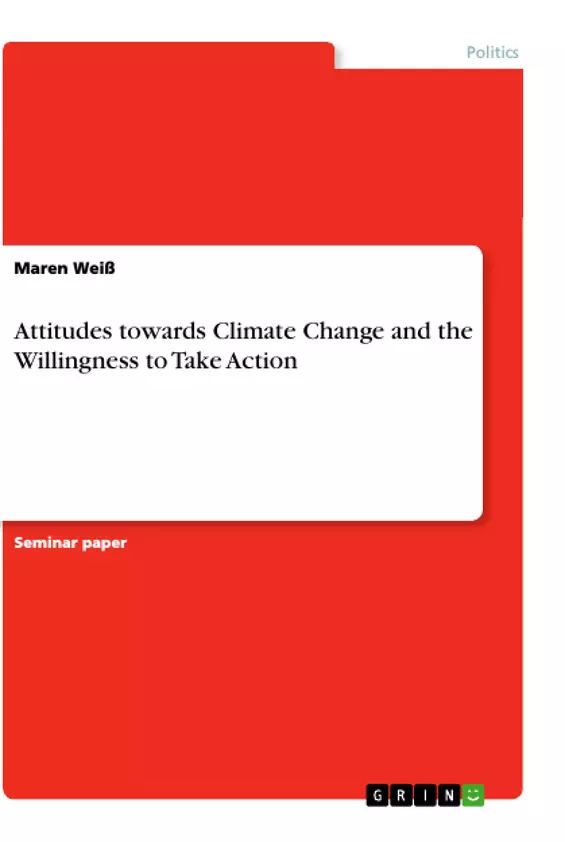This research paper deals with the current issue of the global climate crisis and the personal responsibility to act against it. Theoretically, it is based on the combination of the paradox of voting and the collective action problem, which are adapted to the topic of the climate crisis. Within the seminar paper, four assumptions about knowledge, the perception of urgency, responsibility and the willingness to take action are developed, which ought to solve the assumed free-rider-problem within the climate crisis. Background for the discussion delivers a qualitative content analysis based on Mayring (2015) and Kuckartz (2016). Five qualitative interviews with master students of political science of the University of Bamberg were conducted with the help of an open guideline. The interviews were coded through the computer-aided program MAXQDA.
Inhaltsverzeichnis (Table of Contents)
- An Introduction to the Topic Climate Crisis
- Theory and Assumptions
- Definition of the Concept Climate Crisis
- Theoretical Assumptions about the Climate Crisis and individual Behaviour
- Knowledge and the Perception of the Climate Crisis
- Urgency and Feelings of Responsibility
- Feelings of Responsibility, Effectiveness and Willingness to take Action
- The Role of Political Science Students
- Research Design
- Qualitative Method of Investigation
- Data Collection through Interviews
- The Survey Instrument: Guided Interviews
- Problem-Focused Interview
- Operationalization
- Practical Research Details
- Access to Case Selection
- Aspects of the Survey Situation
- Data Analysis / Coding
- Analysis
- Knowledge and Perception of Importance
- Feelings of Responsibility towards Climate Crisis
- Perception of Effectivity and Willingness to take Action
- Perceived Problems with Climate Crisis
- Interpretation
Zielsetzung und Themenschwerpunkte (Objectives and Key Themes)
This research paper examines the current issue of the global climate crisis and the personal responsibility to act against it. The paper aims to understand how political science students perceive the climate crisis and their willingness to take action against it. It explores the potential policy implications of this attitude formation process, particularly for those who deny climate change and are reluctant to change their behaviour. The paper utilizes a qualitative approach, conducting interviews with political science students to gain insights into their perspectives and motivations.
- The relationship between knowledge, perception of urgency, responsibility, and willingness to take action in relation to the climate crisis.
- The application of the paradox of voting and the collective action problem to the context of climate change.
- The role of individual behaviour in addressing the climate crisis and the importance of understanding subjective decision-making processes.
- The identification of potential policy interventions that can encourage individual action against climate change.
- The exploration of the influence of media coverage and public discourse on individual attitudes towards the climate crisis.
Zusammenfassung der Kapitel (Chapter Summaries)
- An Introduction to the Topic Climate Crisis: This chapter provides a contextual overview of the climate crisis, highlighting its socio-political significance and emphasizing the need for research into individual decision-making regarding this issue. The research question of the paper is introduced: "How do master students of political science perceive the climate crises and are they willing to take action against it?"
- Theory and Assumptions: This chapter delves into the theoretical framework underpinning the research. It defines the term "climate crisis" and explores the paradox of voting and the collective action problem, adapting them to the context of climate change. The chapter then outlines four key assumptions that aim to address the "free-rider problem" within the climate crisis.
- Research Design: This chapter details the research methodology employed in the paper. It justifies the use of qualitative guided interviews with political science students, explains the operationalization of key concepts, and outlines the practical research details, including data analysis and coding using MAXQDA.
- Analysis: This chapter presents the results of the data analysis, examining the interviews in relation to the four formulated assumptions. It explores the participants' knowledge and perception of the climate crisis, their feelings of responsibility, their perception of the effectiveness of individual actions, and their perceived problems associated with climate change.
Schlüsselwörter (Keywords)
This seminar paper focuses on the climate crisis and the individual responsibility to act against it. It explores the paradox of voting, the collective action problem, and the concept of the free-rider problem in the context of climate change. Key concepts include knowledge, perception of urgency, feelings of responsibility, effectiveness, and willingness to take action. The paper utilizes a qualitative approach, employing guided interviews with political science students to analyze their perspectives and motivations. The study relies on qualitative content analysis, using the computer-aided program MAXQDA for data analysis and coding.
Frequently Asked Questions
What is the "collective action problem" in climate change?
It refers to the situation where individuals may choose not to act against the climate crisis because they hope others will do the work, leading to a "free-rider" effect.
How do political science students perceive the climate crisis?
Research shows they generally have high awareness and knowledge, but their willingness to act depends on their individual feelings of responsibility and perceived effectiveness of their actions.
What role does the "paradox of voting" play in this study?
The paradox of voting is used to explain why individuals might feel their single contribution is too small to make a difference, which can hinder personal climate action.
What method was used to analyze the student interviews?
The paper uses qualitative content analysis (based on Mayring and Kuckartz) and computer-aided coding with the program MAXQDA.
Can individual behavior really solve the climate crisis?
While systemic change is needed, the paper explores how understanding individual decision-making processes can lead to better policy interventions that encourage personal responsibility.
- Quote paper
- Maren Weiß (Author), 2020, Attitudes towards Climate Change and the Willingness to Take Action, Munich, GRIN Verlag, https://www.grin.com/document/1127980



